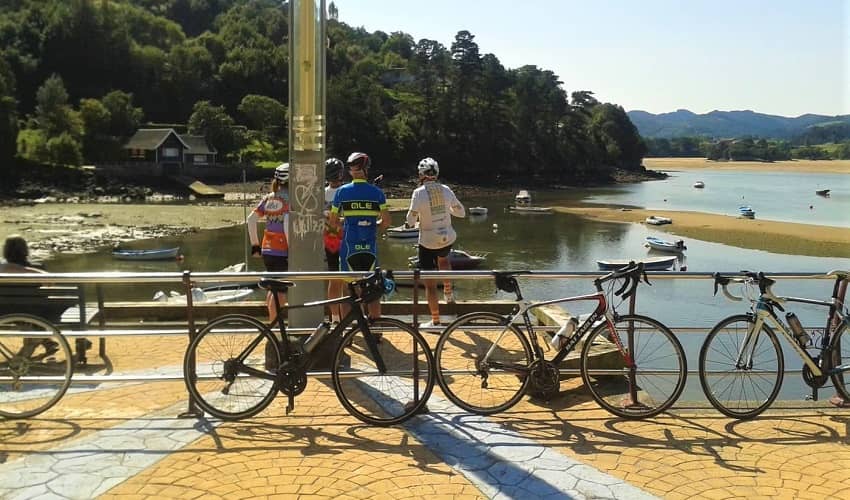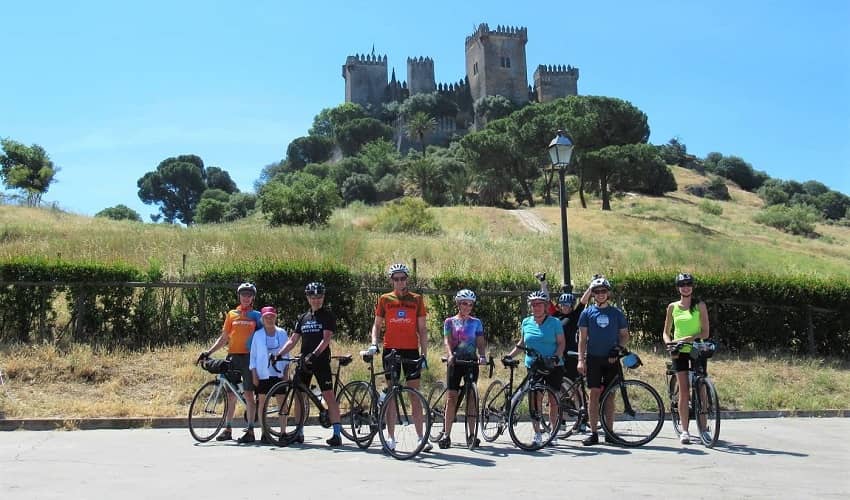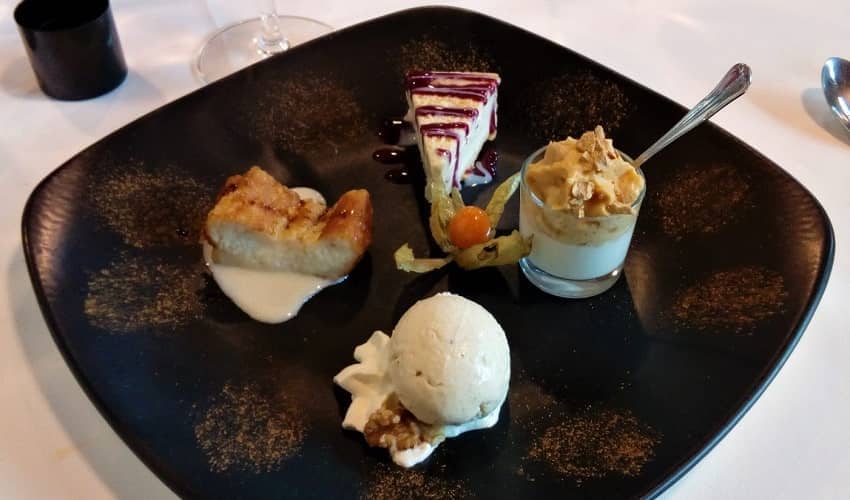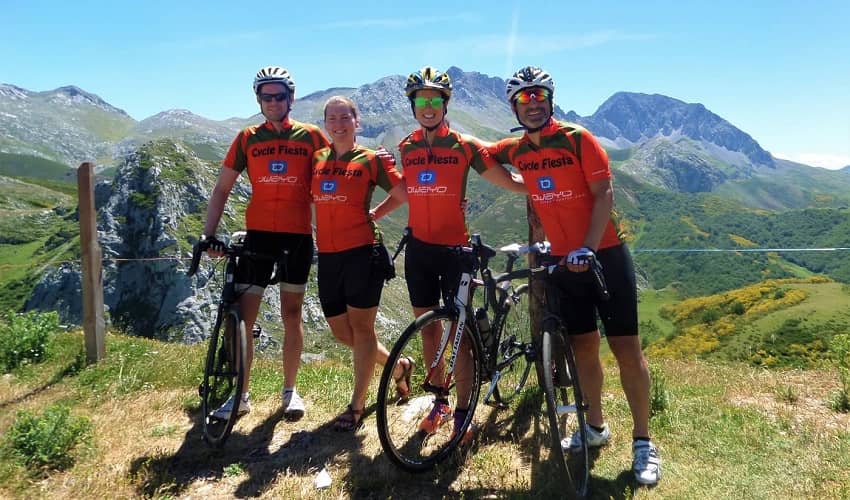Choosing a Tour Operator for a Cycling Holiday
Many people like to book their cycling holidays through a tour operator. A good operator will take care of all the
organisation: booking hotels, transporting luggage, arranging entry to local attractions, organising meals and generally
making the holiday as enjoyable as possible.
A great tour operator will help to really immerse you in the culture of a region. As well as taking you to the major sights and best cycling routes, they will also sometimes take you off the beaten track, using local knowledge and expertise.
The problem is that, when searching for holiday, it can be difficult to know what separates the great tour operators from the average. Here we list some of the key points that you may want to consider before booking your cycling holiday, to make sure that it is the right one for you.
This is a kind of inside guide to the travel industry and how difference companies operate, and what the advantages and disadvantages are of the various business models.
Please bear in mind that we are a small, independent tour operator, and, of course, we believe that we offer the best experience. However, we have tried to be at least somewhat objective!
A second type of tour operator is one that is also large scale, offering tours all over the globe. They don't purchase tours from local operators, but rather run their own tours often with the help of local guides. These companies tend to have dozens or hundreds of employees in dedicated roles - for example, the sales team is completely separate to the people who run the holiday.
Thirdly, there are the small, local tour operators (like us!). They tend to specialize in a specific region and run the tours themselves. At most these companies have just a handful of employees, and they tend to be actively involved in both selling and running the tours.
They may also have physical shops that you can visit, and they often have discounts and promotions to entice customers. They are easy to find and, if you don't like spending time looking through different options or trying to find the 'perfect' holiday, then this visibility can make it easy for you to quickly book a holiday.
With this visibility comes a reputation. There is an understanding that you are guaranteed a certain level of service, because a large company with high visibility needs to maintain its reputation in order to be successful.
By contrast, locally based tour operators often lack visibility. Many have very small marketing budgets. They may pay for a few online adverts, but most get their bookings by selling tours to these larger companies who will then do the advertising for them.
At Cycle Fiesta, we really don't like getting involved in all that. We only sell our tours through this website and don't pay for any marketing (apart from the website). The downside of this is that our tours are not so visible and we don't have such a significant online presence.
By contrast, smaller independent companies may be run by just two people, and so communication can be slower, especially if you are in a different time zone. They may prefer to respond to questions by email.
The advantage is that, when communicating with local operators, you will often be in contact with the same people who will be running your tour. They will be able to answer questions about the tour and will be generally be more flexible in adapting to any requirements you have.
Proving their trustworthiness can be a big problem for local tour operators, and as such, many rely heavily on 'word of mouth' for bookings. At least within the European Union though, you can be pretty much guaranteed that your money won't just disappear without a trace.
All EU based tour operators - of whatever size - are legally obliged to be fully bonded and have certain insurances, so your booking is financially protected if anything happens to the company, or if they fail to comply with their cancellation policy.
Of course, there are still scammers in every industry, so you have to be diligent. But once you are confident that you are dealing with a legitimately registered operator, you shouldn't worry about booking with them.
Being locally based, having knowledge of the language and customs, as well as places off the beaten track is invaluable in providing a great customer experience. They also have a vested interested in providing a great experience, because it is their company and their reputation at stake - which is not always the case with employees of larger enterprises.
This also means there is greater flexibility. Locally based companies can more easily customize or tailor tours if you have specific interests. They can offer advice about changes that could be made, and can modify itineraries quickly and with little administrative cost.
The experience with larger companies tends to be slightly more formulaic. The tour is often not designed by the same people who are facilitating it on the ground, and there is limited opportunity to go off the beaten track and take advantage of interesting opportunities that present themselves.
This is not necessarily a negative thing, depending on what you look for in a holiday. The holidays are formulaic partly because they are popular like that and they work well. I'm sure larger companies would argue that, if you have a winning formula, why change it?!
Regarding guides and tour leaders; they can be a bit hit or miss when they are contracted by larger companies. Some may be excellent - with years of experience in the local area and who take great pride in their work. Others, however, may be a little less passionate and may be less able to provide a great experience or to be adaptable to the desires of a group.
One thing to consider is whether or not flights are included, and if you would want them to be. Large companies sometimes offer packages which include flights Smaller, locally based operators, by contast, almost never offer flights as it's simply not practical.
Check out what transfers are included, as well as the meals (and what exactly are them meals: Are they taken in charming local restaurants or in a soulless hotel bar?). Is bike hire included, or is that something that has to be added on to the cost?
Most importantly of all is the standard of accommodation. Be wary of interaries that are vague about this. In this day and age, there is not really any reason for a tour operator not to name the hotels where you will be staying, or at least to give a detailed description.
Essentially, it's important to look into the details, not just the headline price. A tour offering incredible boutique accommodation, with bike hire included and where meals are taken in excellent restaurants, might be slightly more expensive than a holiday with average accommodation and where you eat in the hotel buffet every night. But the former undoubtedly represents much better value in terms of the experience it offers?
Some companies do try to cut costs by not including certain things, or by offering a substandard service in certain areas. It's useful to be aware of that and not to focus too much on the price - but rather to look at the value of the holiday as a whole.
The reason for this is that they have much lower overheads. Large companies who re-sell tours often collect between 20% and 25% of the cost of the holiday - which is a considerable amount.
By cutting out that middle man and all the associated advertising costs, it is consdierably cheaper to purchase directly from a local operator. Essentially, more of what you are paying for the holiday is being spent on things like accommodation and the service provided.
So what do you get for the extra price if you buy through a middle man in the form a larger tour operator? Well, it means that the contract for your holiday is with the larger operator, who may be based in your country and is easier to deal with in the case of cancellations or other problems (although this isn't always the case).
Some (often smaller) tour operators don't list prices for their holidays. We genuinely don't know the reason for this - perhaps they change regularly due to fluctuating hotel prices. But, in our opinion, a lack of clarity and openness is something of which to be slightly wary.
With smaller locally based companies, there is a bit less certainty in what you will be getting. If you find a good operator then their presence on the ground allows them to provide unique experiences, which can really immerse you in the culture of a specific region. You will also get more for your money, because there is no middle man involved, and the holiday will be run by people with a real passion for what they are doing.
On the other hand, you may end up with a not so good operator. Communication may be difficult, they may cut corners and they may not have gone the extra mile to fully research all the possibilities of the regions where they operate.
With local operators so much depends on the individuals who run the company and the tours; there is no overarching corporate identity. And it can be difficult to find out in advance who is good and who is not so good. Hopefully some of the tips in this article can help to steer you towards a good tour operator.
Our advice to most people would be to try to find a good local tour operator, one who seems passionate about what they do, and to book with them directly. But, of course, as a locally based tour operator, we would say that! And perhaps, it might not be the best option for everybody.
Hopefully we haven't made it seem too much of a minefield for you. And please remember that whichever holiday you book, the chances are that you will have a great time.
A great tour operator will help to really immerse you in the culture of a region. As well as taking you to the major sights and best cycling routes, they will also sometimes take you off the beaten track, using local knowledge and expertise.
The problem is that, when searching for holiday, it can be difficult to know what separates the great tour operators from the average. Here we list some of the key points that you may want to consider before booking your cycling holiday, to make sure that it is the right one for you.
This is a kind of inside guide to the travel industry and how difference companies operate, and what the advantages and disadvantages are of the various business models.
Please bear in mind that we are a small, independent tour operator, and, of course, we believe that we offer the best experience. However, we have tried to be at least somewhat objective!
Which Tour Operator Should I Use?
In general there are three types of tour operators that organise cycling holidays. Firstly, there are large companies who sell tours in destinations all around the world. They are not selling their own tours, but rather are purchasing tours from local operators, and reselling them at a higher cost, which determines their profit margin.A second type of tour operator is one that is also large scale, offering tours all over the globe. They don't purchase tours from local operators, but rather run their own tours often with the help of local guides. These companies tend to have dozens or hundreds of employees in dedicated roles - for example, the sales team is completely separate to the people who run the holiday.
Thirdly, there are the small, local tour operators (like us!). They tend to specialize in a specific region and run the tours themselves. At most these companies have just a handful of employees, and they tend to be actively involved in both selling and running the tours.
Visibility & Presence
Larger companies are usually much more visible. Many have a large marketing department who advertise the holidays in the form of expensive websites, online adverts, newsletters and other offline advertisments in local publications. They often have gorgeous brochures listing dozens of tours, with professional taken photographs.They may also have physical shops that you can visit, and they often have discounts and promotions to entice customers. They are easy to find and, if you don't like spending time looking through different options or trying to find the 'perfect' holiday, then this visibility can make it easy for you to quickly book a holiday.
With this visibility comes a reputation. There is an understanding that you are guaranteed a certain level of service, because a large company with high visibility needs to maintain its reputation in order to be successful.
By contrast, locally based tour operators often lack visibility. Many have very small marketing budgets. They may pay for a few online adverts, but most get their bookings by selling tours to these larger companies who will then do the advertising for them.
At Cycle Fiesta, we really don't like getting involved in all that. We only sell our tours through this website and don't pay for any marketing (apart from the website). The downside of this is that our tours are not so visible and we don't have such a significant online presence.
Communication
Larger companies are generally easier to communicate when booking a tour. They may have a dedicated call center and can promptly answer questions either by phone or email.By contrast, smaller independent companies may be run by just two people, and so communication can be slower, especially if you are in a different time zone. They may prefer to respond to questions by email.
The advantage is that, when communicating with local operators, you will often be in contact with the same people who will be running your tour. They will be able to answer questions about the tour and will be generally be more flexible in adapting to any requirements you have.
Booking Safety & Security
It can be more reassuring to book with a large travel agent that is based in your own country. You can get references for them more easily and can be confident that you are getting what you pay for.Proving their trustworthiness can be a big problem for local tour operators, and as such, many rely heavily on 'word of mouth' for bookings. At least within the European Union though, you can be pretty much guaranteed that your money won't just disappear without a trace.
All EU based tour operators - of whatever size - are legally obliged to be fully bonded and have certain insurances, so your booking is financially protected if anything happens to the company, or if they fail to comply with their cancellation policy.
Of course, there are still scammers in every industry, so you have to be diligent. But once you are confident that you are dealing with a legitimately registered operator, you shouldn't worry about booking with them.
Local Knowledge & Expertise
In terms of knowledge and expertise, we believe that locally based companies have a significant advantage. They are specialists in a certain area. At Cycle Fiesta, for example, Ian and Lucia have designed the tours, researched them thoroughly with the help of local contacts and experts, and have experience of leading them many times.Being locally based, having knowledge of the language and customs, as well as places off the beaten track is invaluable in providing a great customer experience. They also have a vested interested in providing a great experience, because it is their company and their reputation at stake - which is not always the case with employees of larger enterprises.
This also means there is greater flexibility. Locally based companies can more easily customize or tailor tours if you have specific interests. They can offer advice about changes that could be made, and can modify itineraries quickly and with little administrative cost.
The experience with larger companies tends to be slightly more formulaic. The tour is often not designed by the same people who are facilitating it on the ground, and there is limited opportunity to go off the beaten track and take advantage of interesting opportunities that present themselves.
This is not necessarily a negative thing, depending on what you look for in a holiday. The holidays are formulaic partly because they are popular like that and they work well. I'm sure larger companies would argue that, if you have a winning formula, why change it?!
Regarding guides and tour leaders; they can be a bit hit or miss when they are contracted by larger companies. Some may be excellent - with years of experience in the local area and who take great pride in their work. Others, however, may be a little less passionate and may be less able to provide a great experience or to be adaptable to the desires of a group.
What is Included
When looking at holidays and comparing those from different operators, it's worth paying special attention to what exactly is included on the tour.One thing to consider is whether or not flights are included, and if you would want them to be. Large companies sometimes offer packages which include flights Smaller, locally based operators, by contast, almost never offer flights as it's simply not practical.
Check out what transfers are included, as well as the meals (and what exactly are them meals: Are they taken in charming local restaurants or in a soulless hotel bar?). Is bike hire included, or is that something that has to be added on to the cost?
Most importantly of all is the standard of accommodation. Be wary of interaries that are vague about this. In this day and age, there is not really any reason for a tour operator not to name the hotels where you will be staying, or at least to give a detailed description.
Essentially, it's important to look into the details, not just the headline price. A tour offering incredible boutique accommodation, with bike hire included and where meals are taken in excellent restaurants, might be slightly more expensive than a holiday with average accommodation and where you eat in the hotel buffet every night. But the former undoubtedly represents much better value in terms of the experience it offers?
Some companies do try to cut costs by not including certain things, or by offering a substandard service in certain areas. It's useful to be aware of that and not to focus too much on the price - but rather to look at the value of the holiday as a whole.
Price Differences
Speaking of prices, specialist operators, selling their own tours, will generally be cheaper than larger companies.The reason for this is that they have much lower overheads. Large companies who re-sell tours often collect between 20% and 25% of the cost of the holiday - which is a considerable amount.
By cutting out that middle man and all the associated advertising costs, it is consdierably cheaper to purchase directly from a local operator. Essentially, more of what you are paying for the holiday is being spent on things like accommodation and the service provided.
So what do you get for the extra price if you buy through a middle man in the form a larger tour operator? Well, it means that the contract for your holiday is with the larger operator, who may be based in your country and is easier to deal with in the case of cancellations or other problems (although this isn't always the case).
Some (often smaller) tour operators don't list prices for their holidays. We genuinely don't know the reason for this - perhaps they change regularly due to fluctuating hotel prices. But, in our opinion, a lack of clarity and openness is something of which to be slightly wary.
Who to Choose?
So, overall you can see that there are some key differences between the different types of tour operators who run cycling holidays. With larger companies you tend to get a more secure and controlled experience. You know more or less what you are getting with them. Communication tends to be quite good and they have templates for running tours across the world that have proved to be successful.With smaller locally based companies, there is a bit less certainty in what you will be getting. If you find a good operator then their presence on the ground allows them to provide unique experiences, which can really immerse you in the culture of a specific region. You will also get more for your money, because there is no middle man involved, and the holiday will be run by people with a real passion for what they are doing.
On the other hand, you may end up with a not so good operator. Communication may be difficult, they may cut corners and they may not have gone the extra mile to fully research all the possibilities of the regions where they operate.
With local operators so much depends on the individuals who run the company and the tours; there is no overarching corporate identity. And it can be difficult to find out in advance who is good and who is not so good. Hopefully some of the tips in this article can help to steer you towards a good tour operator.
Our advice to most people would be to try to find a good local tour operator, one who seems passionate about what they do, and to book with them directly. But, of course, as a locally based tour operator, we would say that! And perhaps, it might not be the best option for everybody.
Hopefully we haven't made it seem too much of a minefield for you. And please remember that whichever holiday you book, the chances are that you will have a great time.



